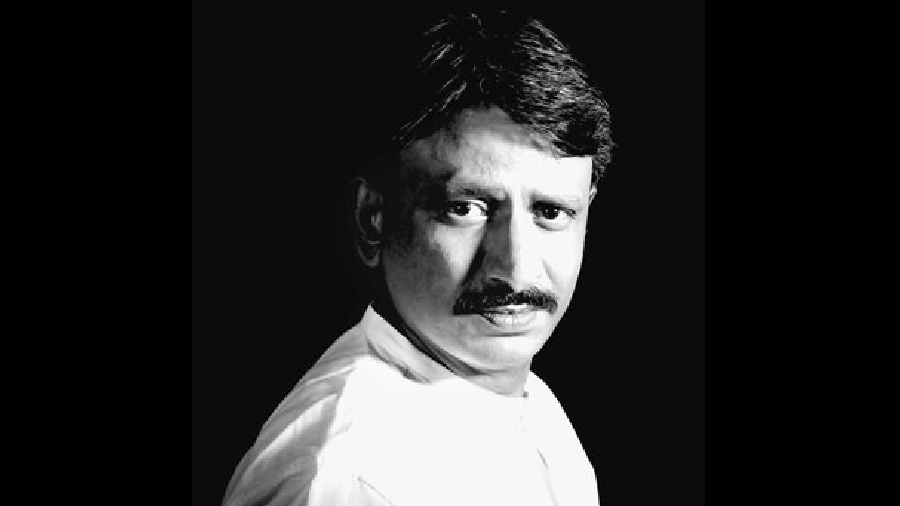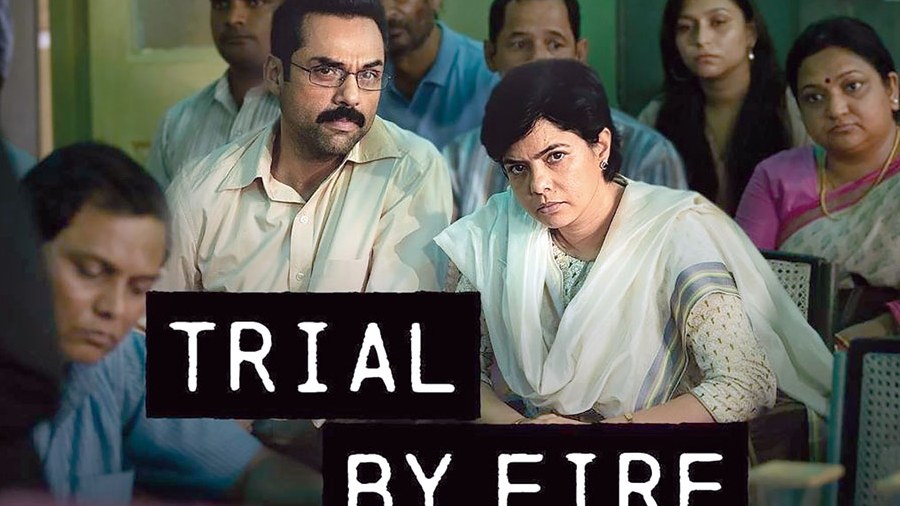On the fateful day of June 13, 1997, a fire at the Uphaar cinema hall in Delhi claimed 59 lives, all of whom had strode in happily to watch the new release Border but didn’t make it out alive. It was a tragedy that shook the nation, even as it came to the forefront that the fire was a result of negligence and widespread corruption.
For 25 years now, Neelam and Shekhar Krishnamoorthy — who lost their teenaged children Unnati and Ujjwal in the fire — have rallied together with other families and fought not only for justice, but also to bring about widespread policy change and accountability.
Their journey is showcased in Trial By Fire, a seven-episode series that drops on Netflix this Friday. Starring Abhay Deol and Rajshri Deshpande as Shekhar and Neelam, the show captures the human story and the determined fight of the couple, and makes for an engaging and deeply emotional watch. The Telegraph chatted with Abhay, Rajshri and Rajesh Tailang (who plays Veer Singh, a scapegoat who is a victim himself) on their poignant and powerful series.
In a country where apathy and corruption force most victims and their families to forget and move on, the Uphaar tragedy remains fresh in our minds 25 years later. Would you say that this is predominantly because of the unrelenting fight and dogged resilience put up by Neelam and Shekhar Krishnamoorthy?
Rajshri Deshpande: In a way, yes. What Neelam and Shekhar did was to get up and go to the trial court every single day, come back and then get up again and go. They have done that for 25 years, and continue to do so. They haven’t done this just for their children or for themselves but for the whole country. I think it’s very important for a person to stand up... otherwise you become history. It’s very easy in our country and, in fact, all over the world to become history and for people to say, ‘Oh this incident happened at that time, and no one took a stand’.
You have to be persistent, and that’s what Neelam and Shekhar did. They decided very early on that whatever happens, they will fight. In our country, it’s easy to give up and not fight. ‘Let it be, let’s move on, now we have our own lives’... these are easy to say. But it’s difficult to say, ‘No, I will stand up and go to the trial court. Even if nothing happens today, I will go tomorrow again’.
There will be a time when all of us will have to deal with certain trials and tribulations. And how we deal with them defines who we are. That’s why Neelam and Shekhar’s empowering story of struggle and resilience is very important. The whole AVUT (Association of the Victims of Uphaar Tragedy) team’s journey is important. It teaches people like us to be like Neelam... I want to be Neelam, I want that courage. This is a very inspiring story.
Abhay Deol: You are right... it did take their resilience to keep the memory alive. If it wasn’t for certain individuals, this incident would have been just another footnote in our history. And while Neelam is focused on getting justice and is very passionate about it, because Shekhar is a different personality and thinks about the practical side of things as well, you may sometimes think he lacks the passion, but actually he’s just as focused on doing what’s right. He channels his anger towards policy change and in bringing the families of the victims together. There is a lesson to be learnt here... that if you want justice and a resolution, then you have to come together as a team. It may take a leader to get you together, but it ultimately takes your unity to see it through.
This is especially true in the times today, where the world is so polarised, people have to realise that only they can come together and make change... it’s very easy to bring a person down, but it’s tough to bring an entire group down.
All of you play ordinary characters thrust into extraordinary situations. What did you take back from the person that you played? I really liked that line that Rajshri used in an Instagram post where she said that Neelam has become her ‘North Star’...
Rajesh Tailang: My character (Veer Singh) is the victim of tragic circumstances. He was made to stand as a criminal in court, but he’s also a victim himself. He has spent 20-25 years of his life just going in and out of jail... he never even realised when his children grew up and how everyone’s lives changed. This is a story of how our system is so unfair and the passion which is shown by a small set of people — led by Neelam and Shekhar — in fighting against that system.
Abhay: What I was most amazed was his ability, his vision to make good of this situation. Obviously, there is the initial shock of loss and anger, but in that most extreme and tragic and vulnerable situation to be able to channel your pain and to have the empathy to say that this should not happen to anyone else.... To have such a grounded sense of responsibility within all these extreme emotions and to say, ‘We need some policy change’. Just to have that practical mindset even when he was grieving and angry speaks so much about how he deals with that grief.
Rajshri: I have taken the whole of Neelam with me (smiles). As women, we have so many different challenges to face. But the main thing is that you don’t stop, you continue. That is also there within me — I do a little bit of social work in villages — but what Neelam has is extraordinary. She believes in action over anything else. Neelam has been fighting to bring about changes in the system. She is working on ‘badlav’ (change) when initially it was more about ‘badla’ (revenge). She didn’t wait for change... she stood up and said, ‘I will bring in that change’.

I have been a student of cinema and my association with Uphaar has always been strong. But this tragedy was much, much bigger than anything else. When Prashant (Nair, the director of the series) told me that my episode would be filmed in a single shot, that was interesting for me. I wanted people to know about the tragedy and that’s why I wanted to do this — RAJESH TAILANG
Was there a singular reason that made you want to tell this story?
Rajesh: I have watched a lot of films at Uphaar, and even IFFI (International Film Festival of India) used to be held there earlier, along with Siri Fort. I have been a student of cinema and my association with Uphaar has always been strong.But this tragedy was much, much bigger than anything else. When Prashant (Nair, the director of the series) told me that my episode would be filmed in a single shot, that was interesting for me. I wanted people to know about the tragedy and that’s why I wanted to do this.
Rajshri: When I was approached with the script, I really wanted to know more about this tragedy, I wanted to enact it out, I wanted the world to know about what happened and the aftermath of it. When I got the part, I was like, ‘Oh my God! There is so much we don’t know about this!’ I hail from a Tier-3 city in Maharashtra and I didn’t know much about this tragedy when it happened. This gave me an opportunity to tell such an important story.
Abhay: The fact that I remembered this incident vividly and how it shocked me then did play a part in me wanting to do this series. But my decisions are always taken on the basis of the script. I was also mindful of the fact that given that this is based on a real-life tragedy, the intent of making it had to be correct... it shouldn’t be exploitative in nature. I wanted to find out what the series wanted to highlight and I found the script to be deeply empathetic. What I love about this script is how well nuanced it is. When people suppress things, it comes out in different ways. Nothing is black or white.










